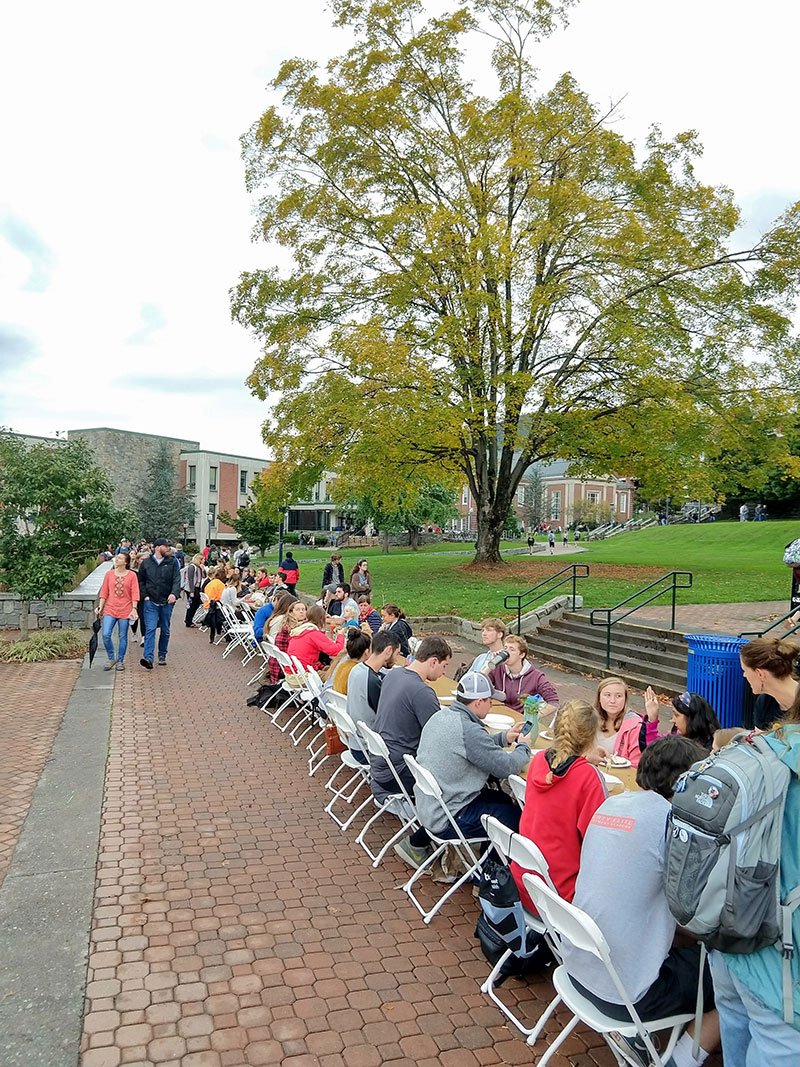Green Events

Community Feast
App State has a deep commitment to working toward zero waste through thoughtful purchasing decisions and upstream solutions to waste management. Hosting a green event is a way to minimize our impact and reduce greenhouse gas emissions, while educating event attendees through leading by example. You are encouraged to green events that you plan which will contribute to sustainability and carbon reduction efforts on campus.
For assistance planning a zero-waste event please contact Jennifer Maxwell, Sustainability Program Director, [email protected], 262-2667
GreenEvents Guide
Event planners can use this guide as they plan activities.
Assign a sustainability liaison
- Identify someone to be the communicator and representative for your scheduled event.
Collaborate with Sustainability and Energy Management to develop a sustainable event plan. Be sure to keep the office informed so that your efforts can be recognized and celebrated.
Sustainable Event Planning
Reduce your waste from the very beginning of your event planning. This is a great way to show your organization’s authentic commitment to sustainability.
- Walk or bike to planning meetings, or attend virtually.
- Think before you print - forward your meeting agendas electronically.
- Create a budget that incorporates green event practices.
- Educate event staff about zero waste and what the commitment means.
Choosing a venue or location
- Choose a location that minimizes travel for attendees, use virtual meeting options, or pick a venue attendees can walk or bike to.
- Consider holding your event during daylight hours to use natural light or host events outdoors.
- Inform attendees about Appalcart and its schedule.
- Consider holding events in buildings that are currently open and occupied.
Communication and advertising
- Use digital advertising and communication channels.
- If you must advertise via paper and mail, print addresses directly on the envelopes. Do not use labels. When printing, purchase 100% post-consumer recycled paper and note it on the printed material. Print double-sided and reduce the font size.
- When developing event materials, decorations, and signage, design them to be durable and timeless so that they can be reused.
- Advertise the event as a “sustainable event”.
Purchasing and materials
Take advantage of the resources the university offers to save on event costs. Production costs are one of the most hidden costs from buyers, so look into sustainable products to check the level of impact the production has on the environment.
- Use tables, chairs, and tents from the university instead of buying new materials.
- Design signage with a general look so that they can be used year after year.
- When purchasing promotional materials or gifts, choose sustainably made products (examples of sustainable giveaways: solar camp lights, trees to plant, reusable straws and utensils).
- Avoid using promotional materials like candy or flyers that can create more waste; rather, use products that the attendees can reuse.
- If there are giveaways/door prizes, make them eco-friendly.
Sustainable dining
Sourcing from local producers not only provides healthy choices but also helps build community and support the local economy.
- Serve primarily vegetarian/vegan (plant-based) options and use signage to explain these choices.
- Consider locally grown and organic options to further reduce the carbon footprint.
- Offer food options such as gluten-free, vegan, vegetarian, sugar-free, and lactose-free.
- Serve fruits and vegetables that are in season.
- Have participants register for meals in advance because this helps reduce costs while minimizing resource demand.
- Donate leftovers to those in need.
Minimize waste
Waste removal is often overlooked, but it is vital to the success of every event. Set up zero waste stations with recycling and composting containers - put a work order request through the AIM system to request containers from Facilities Operations - be sure to specify that you will need compost and recycling containers. Reach out to the Sustainability and Energy Management office to receive color-coded signage. Help guests properly sort their waste and recycling by having zero-waste attendants.
- Always choose reusable plates, glasses, utensils, and cloth napkins..
- If reusables are not an option, request compostable food serviceware and packaging.
- Use bulk condiments rather than individual packets.
- Do not offer single-use water - serve water in pitchers. Share water filtration refill station locations with the attendees.
- Promote BYOB – bring your own bottle/coffee mug.
After the event
- Have recycle and compost clean-up volunteers to help after an event.
- Double-check bins for any contaminants.
- Work with Facilities Operations for recycle and compost container pick-up.
- Work with caterers to donate leftover food to local food coalitions and food banks.
- Post and share your accomplishments!